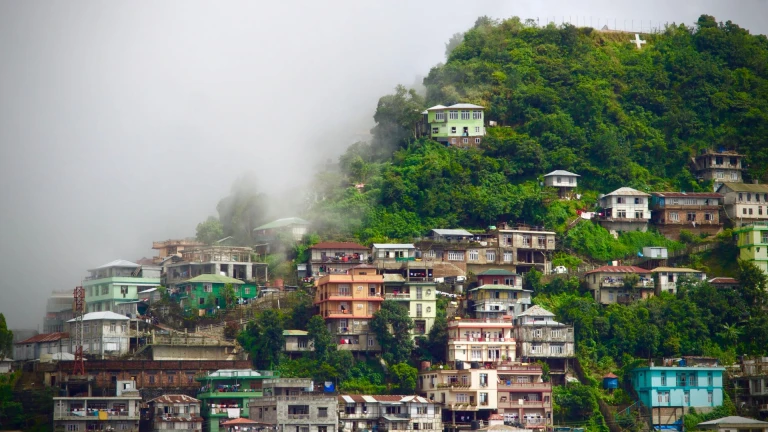Aizawl - The Only Indian City with No Traffic and Honks!
As we leave our home, the recurring concern is the inevitability of encountering a "traffic jam." Seeking refuge in Google Maps, we attempt to find a route devoid of congestion. There's a paradoxical notion that appreciating a place's beauty involves enduring traffic jams—an odd perspective with a potential silver lining we may overlook.
Modern privileges allow us to anticipate and brace for potential traffic jams. These situations, while often frustrating, create both magical and tragic moments. Amidst shouts and frustration, some experience unforgettable moments—a novice driver navigating the chaos for the first time, others dancing to car music. Countless stories emerge, but this article pivots back to its main theme: traffic jams and a unique place without them.

In Aizawl, where nearly 3.5 lakh people navigate approximately 1.25 lakh registered vehicles, even in slow-moving traffic covering a mere 15 km could take an hour or two. This achievement in Aizawl is a result of collective citizen initiative. Despite the urgency of reaching destinations, residents refrain from honking, overtaking, or disrupting queues—a testament to the city's commitment to traffic discipline.
Mizoram's stringent traffic rules stem from the challenge of urbanization, with around 50 percent of Aizawl's population residing in urban areas. As the population and vehicles grow, spatial limitations prevent expansion, necessitating strict regulations. Honking, a common contributor to noise pollution, has been effectively curbed in Aizawl, standing in stark contrast to the noisier cities like Mumbai, Lucknow, New Delhi, Hyderabad, and Chennai, as reported in 2013.
Also Read: After floods, Sikkim is now welcoming tourists!
How This Policy Benefits Tourists
Aizawl's adherence to a no-honking policy establishes a serene and tranquil atmosphere, positioning it as an ideal destination for tourists seeking a peaceful retreat. The absence of incessant honking noise creates an environment conducive to relaxation, allowing visitors to fully engage with the city's beauty and attractions.
The reduction in noise pollution enhances the overall tourist experience, providing a more immersive and enjoyable environment. This enables a profound connection with the surroundings, offering an opportunity to fully appreciate Aizawl's cultural and scenic aspects.
The implementation of the no-honking policy contributes to enhanced road safety, a significant advantage for tourists exploring the city. With fewer distractions and a culture of disciplined driving, visitors can feel safer as they navigate the streets.
Aizawl's commitment to the no-honking policy reflects the city's values and cultural ethos. Tourists have the opportunity to observe and experience this aspect of local life, gaining insights into the city's emphasis on peace, harmony, and consideration for others.
Also Read: Amarnath Cave Gets a Motorable Road! Raises concerns among Ecologists
Beyond its impact on noise pollution, the policy also contributes to a more sustainable and eco-friendly tourism environment by reducing both noise and air pollution. Tourists can appreciate the city's dedication to environmental well-being and actively participate in responsible travel practices. This success story prompts the suggestion that other cities could draw inspiration from Aizawl's approach and consider implementing similar measures. For those seeking a noise-free vacation, Aizawl emerges as a promising destination.
Published at
About Author
Manya Shastry
Subscribe our Newsletter
Get our weekly tips and travel news!
Related Posts
10 Countries Indians Travelled to Most in 2025: Gen Z Leads Travel Boom
Thailand tops the list as 90% of international trips come from millennials and Gen Z travelers.
10 Most Searched Places in India By Foreign Travellers
Discover India's most popular tourist destinations! From the Taj Mahal to the Himalayas, explore the top 10 places foreign travelers love.
11 New Eco-Tourism Spots Coming to Himachal Pradesh
In a bid to promote sustainable tourism and showcase the pristine beauty of the state, the Himachal Pradesh government has identified 11 new eco-tourism sites.
17 y/o Makes Fake Flights Bomb Threats to 'Frame a Friend' - Leads to Flights Disruptions
Over 19 hoax bomb threats disrupt flights across India, causing massive delays and diversions...
200 Free Highway Trips? FASTag Makes It Possible
Say goodbye to endless toll stops! FASTag’s Annual Pass offers 200 free trips and faster travel.
Latest Posts
5 International Destinations Under ₹50000 in 2026
Explore 5 amazing budget-friendly countries to visit for under ₹50,000 in 2026. Your dream international trip starts here!
5 Underground Wine Cellars in Nashik To Visit In 2026
Explore Nashik’s best underground wine cellars in 2026. Discover cool barrel rooms, aged vintages, and the secrets of winemaking.
7 Palaces Converted to Art Hotels That You Should Visit In 2026 in India
Explore 7 stunning Indian palaces turned art hotels where royal history meets modern creativity. A must-visit guide for 2026!
Top 5 Co-Working Beach Resorts in Goa in 2026
Discover Goa's best workation spots for 2026. From luxury suites to cozy beach pods, find the perfect place to work and play.
7 Must-Visit Free Museums in India for 2026
Explore India's history for free! Discover 7 must-visit museums in 2026, from Mumbai's art hubs to Delhi’s historic landmarks.

